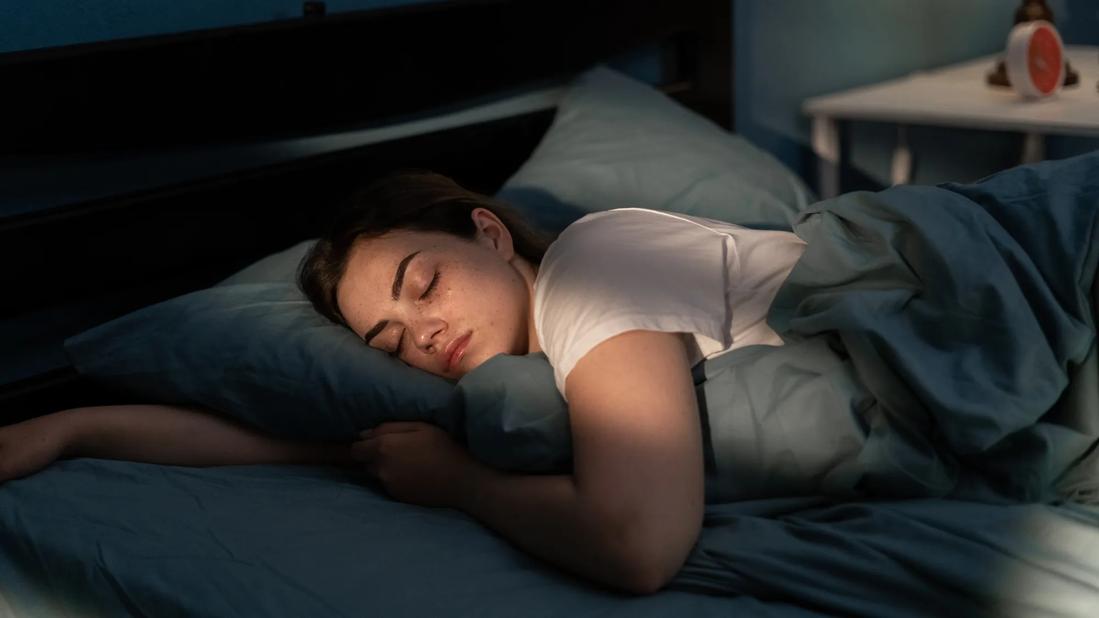Changing hormones, mental health issues and a higher risk for sleep disorders can all impact women’s sleep needs

Image content: This image is available to view online.
View image online (https://assets.clevelandclinic.org/transform/35e3f0af-2aad-41f3-8aea-724df6a905ed/woman-sleeping-1555115923)
Female asleep in bed in darkened bedroom, red alarm clock on table
Experts recommend that adults get at least seven hours of shut-eye nightly. But how much sleep do women need vs. men? Does it matter?
Advertisement
Cleveland Clinic is a non-profit academic medical center. Advertising on our site helps support our mission. We do not endorse non-Cleveland Clinic products or services. Policy
The answer is a resounding yes: There are a few important reasons why women may, in general, need more sleep.
“For most adults, the average sleep need is seven to nine hours, but everybody's sleep need is different,” says sleep disorders specialist Michelle Drerup, PsyD, “and when it comes to sleep and your health, every minute counts.”
She helps us dig deeper into why women often need more sleep than men.
One study shows that, on average, women sleep for 11 minutes more per night than men do — and while that’s a small number that may not apply to everyone, it’s representative of real differences between the sexes and how we sleep.
“Women typically have more issues affecting their sleep, so they may need slightly more of it to make up for disrupted sleep or poor-quality sleep,” Dr. Drerup explains. These issues may include:
Your circadian rhythm — the 24-hour cycle known as your internal clock — can affect your hormones. But it works the other way, too. Changing hormones can affect your sleep cycle and increase your risk of sleep disturbance.
“Women experience hormonal changes monthly with menstrual cycles and with major life stages, like pregnancy, breastfeeding, perimenopause and menopause,” Dr. Drerup shares. “The hormonal changes that occur with menopause are especially damaging to quality sleep.”
Advertisement
Menopause can affect sleep in several ways. You’re more likely to:
Mental health and sleep are closely linked, but experts still consider the relationship a “chicken-or-the-egg” scenario, in terms of which comes first. Poor sleep can affect your mental health, but depression also makes you more likely to have trouble sleeping.
“Women are twice as likely as men to have anxiety and depression,” Dr. Drerup says. “And both conditions are associated with insomnia.”
According to the Sleep Foundation, the impact depression can have on sleep is staggering. Of people with depression:
It’s not always easy to tell whether you feel sluggish because of a sleep issue or a mental health condition, but getting to the root cause can help you get the most effective treatment.
“If you have the desire to do all the things you love but lack the energy, you may just be tired,” Dr. Drerup says. “When depression is the underlying issue, you’re not just tired. You also lack any interest in doing things you usually enjoy.”
Whether hormones, mental health or other underlying issues are to blame, one thing is for sure, women are more likely to have sleep disorders, and that likelihood goes up with age.
The risk for some sleep disorders, including restless legs syndrome, is always twice as high for women than for men. Other conditions, such as sleep apnea, become more concerning as you age. Up to 67% of post-menopausal people have OSA.
“Men have significantly higher rates of OSA than women, but after menopause, the risk is the same for both sexes,” Dr. Drerup clarifies. “Women often have less-obvious symptoms, though, like light snoring or morning headaches. The condition affects their ability to sleep well.”
Everyone’s sleep needs differ, so no matter your sex, you may need to experiment to figure out the right amount of sleep for you.
“The best time to judge whether you got enough sleep isn’t typically right after waking,” Dr. Drerup says. “Instead, assess how you feel later in the morning. How is your energy level? Can you stay focused and do everything you need to do?”
Just don’t wait too long into the day to evaluate your energy! She says it’s normal to feel tired in the early afternoon, so to get the best sense of how you’re feeling, check in before lunch.
Advertisement
To get the most out of your sleep, she recommends that you:
“If you still aren’t sleeping well or feel tired regularly, speak with your primary care physician or a sleep specialist,” Dr. Drerup advises. “Quality sleep is vital to good health, so don’t hesitate to prioritize it.”
Advertisement

Sign up for our Health Essentials emails for expert guidance on nutrition, fitness, sleep, skin care and more.
Learn more about our editorial process.
Advertisement
Sleep masks can help you create total darkness so you can sleep better
To avoid sleep deprivation and shift work sleep disorder, try adopting habits that minimize light exposure and prioritize daytime sleep
Sleep disorders, mental health conditions and other health concerns can all affect the quality of your sleep
Most people fall asleep within 10 to 20 minutes, but if your experience is different, adjusting your sleep schedule may help
Stick to a consistent schedule, be mindful of screen time and work on reducing your stress levels before bed
Napping can boost focus, memory and mood — if you time it right
These devices can help shed light on what’s happening with your body during rest
Keep a dream journal, set your intentions before bed and make sure you’re getting a full night of high-quality sleep
Although it could be used as a moisturizer, this new trend is not recommended
Communicating clear limits helps protect your time, energy and emotional well-being
High cholesterol can be genetic, but testing and treatment can lower your heart disease risk